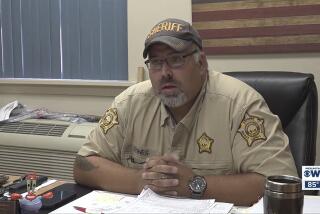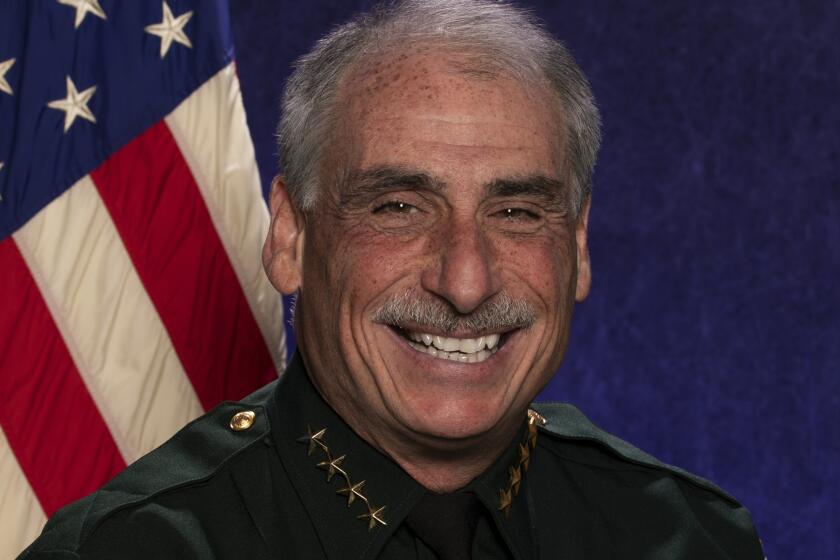Hepatitis C outbreak tied to alleged cost-cutting
Health officials here sensed something was wrong.
It was January, and two acute cases of hepatitis C had been reported to authorities -- the number Clark County averages in a year. The patients, they soon discovered, had one thing in common: Both had undergone procedures at the same clinic.
When investigators arrived at the Endoscopy Center of Southern Nevada, they witnessed staffers reusing medicine vials and syringes during anesthesia, a practice that can transmit blood-borne diseases. The safety lapses -- purportedly in place to cut costs -- dated to at least 2004.
As a result, 40,000 people have been told to seek testing for hepatitis and HIV, the virus that causes AIDS, in what federal officials are calling the largest notification of its kind.
Sharlene Kaufman is one of those people, and she is struggling.
She paced instead of sleeping. She was too panicked to share a cigarette or kiss her father, who is frail from chemotherapy -- even though hepatitis C can’t be transmitted that way. Lacking health insurance, she drove last weekend to the Community Counseling Center in Las Vegas, which has provided more than 100 people with free blood tests.
Kaufman, 37, who had a colonoscopy at the Endoscopy Center two years ago, warily watched medical staff unwrap new syringes before offering her left arm.
“You go to a doctor you think’s out to help you,” she said afterward, her voice shaking, “and he’s out to kill you.”
Later in the week, Kaufman found out she was OK -- though that did little to abate her anger.
The public-health scare has cut across racial and socioeconomic lines, bringing southern Nevada residents together through a shared sense of panic and mistrust.
“These people have psychically cracked,” said Dr. Michael Karagiozis, an HIV specialist who was running the counseling center’s free testing program. “Their safe harbors no longer exist.”
Nevada -- whose population has more than doubled since 1990, to 2.5 million -- has fewer physicians per 100,000 residents and a higher percentage of people without health insurance than most other states, according to the nonprofit United Health Foundation.
Recent checks of other medical centers have turned up more cases in which staff members allegedly reused syringes or vials, said Brian Labus, senior epidemiologist for the Southern Nevada Health District.
“It’s important and big in that it should never have happened at all,” said Dr. Michael Bell, associate director for infection control at the federal Centers for Disease Control and Prevention.
The agency sent a team this week to help Nevada officials inspect the state’s 50 or so surgical centers. Political leaders are haggling over whether the facilities should be checked more frequently than once every three years, an idea Gov. Jim Gibbons recently compared to state troopers trying to catch every speeder.
Meanwhile several law enforcement agencies, including the FBI, are investigating the now-closed Endoscopy Center, and former patients have filed lawsuits against the center, its doctors and health officials.
Dr. Dipak Desai, the center’s majority owner, voluntarily agreed to stop practicing medicine while the state medical board conducted an investigation.
“As a longtime resident of southern Nevada,” Desai said in a statement, “I share our community’s sorrow and concern for those who have been affected by this situation. . . . These unfounded allegations will be addressed in a court of law, when facts have been presented and substantiated.”
With the number of Nevadans harmed by allegedly shoddy health practices still unknown -- officials have so far linked six hepatitis C cases to the center -- state officials have issued a list of questions patients should ask their doctors. Among them: “Can you assure me that I am safe in your facility from the transmission of communicable diseases?”
“You have to wonder how much of the iceberg is showing,” said Sally Hardwick, interim director of the Nevada Center for Ethics & Health Policy at the University of Nevada, Reno.
Substandard injection practices have led to 14 hepatitis outbreaks across the country since 1999, according to the CDC, including one last year in Michigan in which 13,000 dermatology patients were urged to seek testing.
Hepatitis C is a potentially fatal liver disease for which there is no cure; its symptoms include stomach pain, nausea, vomiting and jaundice. Karagiozis, the HIV specialist, said treating a single case can cost $60,000 annually.
So health professionals here must cope with understandably skittish patients.
Dr. Ed Kingsley, a Las Vegas oncologist and the state medical association’s president, said one woman begged to put off her colonoscopy, even though Kingsley referred her to his personal doctor.
“There’s trust and faith that doctors are going to have to regain,” he said, explaining the need for more intensive patient outreach and ethics training for medical personnel.
At the Community Counseling Center, therapists have created a hepatitis C support group; staffers handed out fliers last weekend to those who trickled in for testing.
Doug DeBuono, 30, said he had an endoscopy in 2005 after suffering from abdominal pain and acid reflux. He decided to get checked for hepatitis and HIV partly because he was worried about his 20-month-old son, Steven, who weighed just 3 pounds when he was born prematurely.
Steven recently got a stomach bug. DeBuono’s wife asked their doctor to test him for blood-borne diseases. She and their son were tested too; all the DeBuonos’ tests came back negative.
Still, the couple had to talk DeBuono’s mother into getting a routine mammogram last week -- even though she won’t need blood drawn for it.
“If you can’t trust the people who are supposed to save your life,” DeBuono said, “who can you trust?”
--
More to Read
Sign up for Essential California
The most important California stories and recommendations in your inbox every morning.
You may occasionally receive promotional content from the Los Angeles Times.










